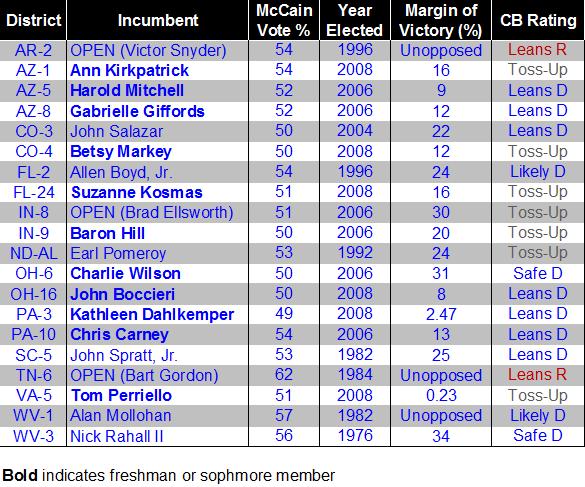Straddling the Party Line: Health Care and the Tenuous Twenty
A Commentary by Isaac Wood
Looking back at last Sunday’s House vote on health care reform, it is crystal clear that the party leanings of congressional districts, not just the party identification of the congressmen, influenced the final tally. Currently, there are 46 Democrats in the House who represent districts won by John McCain in 2008. Even as the bill passed with wide Democratic support, those 46 “divided district” Democrats actually opposed it by a 26-20 vote margin. Among the congressmen who represent districts Obama won, however, health care passed by a huge margin, 199-8.
Republicans will likely concentrate their fire on the “tenuous twenty” Democrats who voted for health care but hail from Republican districts. Already, Sarah Palin has announced a plan to target them with fundraising appeals and even visits to their districts. These Democrats will be seen as low-hanging fruit by Republicans of all stripes who are eager to pick up a large number of seats in this year when the national political winds seem to be blowing in their direction.
The Tenuous Twenty
The GOP will find stiff resistance, however, as they try to take down several of the “yes” voters who have long histories in their districts, despite the Republican advantage at the presidential level. Alan Mollohan (WV-1), Nick Rahall (WV-3), and John Spratt (SC-5) have all represented their districts for over two decades. They may still be vulnerable, but Republicans should not get their hopes up for a clean sweep.
The freshman and sophomore members of the “tenuous twenty” are much more vulnerable as they were elected in years that strongly favored Democrats across the board. This group will be facing their first election in a GOP year and they are not yet fully entrenched, having only served for a few years each. The best hope for those Democrats is a triple play: improvements in Obama’s popularity, the economy, and the public’s perception of health care reform.
But what about the 33 Republicans who represent districts Obama won? The answer is simple: they all voted against the bill. The main surprise “no” was Joe Cao (LA-2) who represents a district Obama won with 75% of the vote in 2008. Adding to the surprise was the fact that Cao voted “yes” on health care in November. Democrats hope he will become the Republican version of Marjorie Margolies, who was taunted by Republicans as she marched to the floor to cast the deciding vote in favor of Clinton’s 1993 budget. Margolies has become the poster child for party loyalty torpedoing a political career after her vote made her a one-termer. Even though Cao’s vote did not affect the outcome of the health care vote, he could well follow in her footsteps.
In general, Republicans are gambling that the usual midterm reaction against the incumbent party will be enough to protect them, regardless of their vote on this issue. Ironically, George W. Bush is perhaps the person who deserves the most credit for their likely safety in November. There simply are not that many potentially endangered Republicans left after the twin Democratic waves of 2006 and 2008 carried most liberal and battleground districts to Democratic shores. Other than Cao’s, the most vulnerable Republican House seats are those being left open by retiring members and their votes will not make much difference in the coming open seat elections.
Ultimately, the health care vote will certainly be a factor in determining the size of the Republican victory in November. Democrats are happy to have passed one of the major items on their wish list and think getting it over with will finally allow them to concentrate on a concrete success instead of the ugly sausage making of congressional legislation. Republicans, however, hope now to prove those famous words of caution: “Be careful what you wish for.”
Isaac T. Woods is the House Race Editor for Sabato's Crystal Ball at the University of Virginia.
See Other Political Commentary
See Other Commentaries By Isaac T. Wood
Views expressed in this column are those of the author, not those of Rasmussen Reports.
Rasmussen Reports is a media company specializing in the collection, publication and distribution of public opinion information.
We conduct public opinion polls on a variety of topics to inform our audience on events in the news and other topics of interest. To ensure editorial control and independence, we pay for the polls ourselves and generate revenue through the sale of subscriptions, sponsorships, and advertising. Nightly polling on politics, business and lifestyle topics provides the content to update the Rasmussen Reports web site many times each day. If it's in the news, it's in our polls. Additionally, the data drives a daily update newsletter and various media outlets across the country.
Some information, including the Rasmussen Reports daily Presidential Tracking Poll and commentaries are available for free to the general public. Subscriptions are available for $4.95 a month or 34.95 a year that provide subscribers with exclusive access to more than 20 stories per week on upcoming elections, consumer confidence, and issues that affect us all. For those who are really into the numbers, Platinum Members can review demographic crosstabs and a full history of our data.
To learn more about our methodology, click here.

